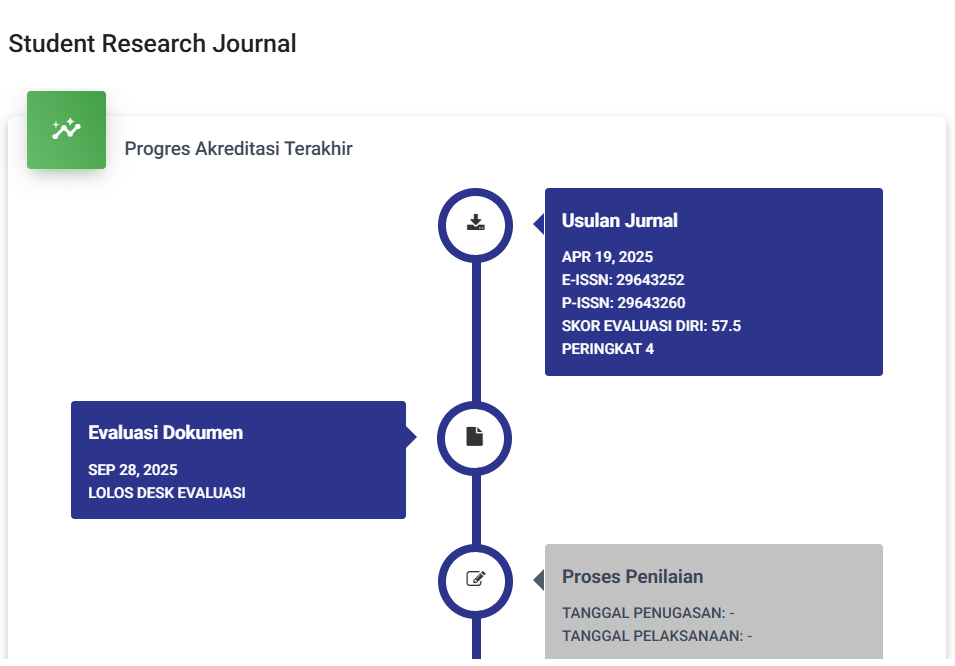Analisis Kondisi Kesehatan Mental di Indonesia Dan Strategi Penanganannya
DOI:
https://doi.org/10.55606/srjyappi.v2i3.1221Keywords:
Depression, mental disorders, psychosocial, shackling, schizophreniaAbstract
Mental health is a crucial aspect of achieving holistic health. Globally, around 450 million people suffer from mental and behavioral disorders, with the highest prevalence in India (4.5%). One in four people will experience a mental disorder at least once in their lifetime. If not properly addressed, mental disorders can worsen and pose a burden on families, communities, and governments. This research aims to understand the mental health situation in Indonesia and its mitigation strategies. This study employs an exploratory descriptive analysis by reviewing literature and secondary data. The unit of analysis is the mental health condition in Indonesia. The results of this study indicate that mental health can be improved through effective public health interventions, focusing on prevention and the role of the community in supporting the optimization of individuals' mental functions. The high number of mental health disorder cases and inadequate handling in Indonesia necessitates comprehensive intervention from the government. Necessary steps include supportive policies, funding allocation, access to mental health services, and community-based approaches.
References
Carrara BS, Ventura CAA. Self-stigma, mentally ill persons and health services: An integrative review of literature. Archives of Psychiatric Nursing. 2018;32(2):317-24.
Dev A, Gupta S, Sharma KK, Chadda RK. Awareness of mental disorders among youth in Delhi. Current Medicine Research and Practice. 2017;7(3):84-9.
Dewi, Kartika Sari. Buku Ajar Kesehatan Mental. Semarang: Lembaga Pengembangan dan Penjaminan Mutu Pendidikan Universitas Diponegoro. 2012.
Direktorat Pencegahan dan Pengendalian Masalah Kesehatan Jiwa dan NAPZA.
Human Rights Watch. Hidup di Neraka, kekerasan terhadap penyandang Disabiltas Psikososial di Indonesia. Human Rights Watch Organization. http://www.hrw.org. Jakarta. 2016.
Kementrian Kesehatan RI. Badan Penelitian dan Pengembangan Kesehatan. Laporan Riset Kesehatan Dasar 2013. Jakarta; Kementerian Kesehatan RI. 2013.
Kementrian Kesehatan RI. Badan Penelitian dan Pengembangan Kesehatan. Laporan Riset Kesehatan Dasar 2007. Jakarta; Kementerian Kesehatan RI. 2007.
Liu B-P, Qin P, Liu Y-Y, Yuan L, Gu L-X, Jia C-X. Mental disorders and suicide attempt in rural China. Psychiatry Research. 2018;261:190-6.
Liu L, Chen X-l, Ni C-p, Yang P, Huang Y-q, Liu Z-r, et al. Survey on the use of mental health services and help-seeking behaviors in a community population in Northwestern China. Psychiatry Research. 2018;262:135-40.
Program Bebas Pasung. Dalam http://sehat-jiwa.kemkes.go.id. Diakses Oktober 2017. 2015.
Siswanto. Kesehatan Mental; Konsep, Cakupan, dan Perkembangan. Yogyakarta: Penerbit Andi. 2007.
Tristiana RD, Yusuf A, Fitryasari R, Wahyuni SD, Nihayati HE. Perceived barriers on mental health services by the family of patients with mental illness. International Journal of Nursing Sciences. 2018;5(1):63-7.
Undang-undang Nomor 18 Tahun 2014 tentang Kesehatan Jiwa. Jakarta. Republik Indonesia.
Wardhani, Yurika Fauziah., Paramita, Astridya. Pelayanan Kesehatan Mental dalam Hubungannya dnegan Disabilitas dan Gaya hidup Masyarakat Indonesia (Analisis Lanjut Riskesas 2007 dan 2013). Buletin Penelitian Sistem Kesehatan. 2016:19(1):99-107.
WHO. Basic Documents. 43rd Edition. Geneva: World Health Organization. 2001.
WHO. Depression and Other Common Mental Disorders. Global Health Estimates. Geneva: World Health Organization. 2017.
WHO. Global Mental Health 2015. Geneva: World Health Organization. 2015.
WHO. Global Mental Health Atlas Country Profile 2014. Geneva: World Health Organization. 2014.
WHO. Improving Health Systems and Services for Mental Health (Mental Health Policy and Service Guidance Package). Geneva: World Health Organization. 2009.
WHO. International Statistical Classification of Diseases and Related Health Problems, 10th Revision, edition 2010. Geneva: World Health Organization. 2010.
WHO. Mental Health Action Plan 2013 – 2020. Geneva: World Health Organization. 2013.
WHO. Prevention of Mental Disorders, Effective Intervention and Policy Options (Summary Report). Geneva: World Health Organization collaboration with the Prevention Research Centre of the Universities of Nijmegen and Maastricht. 2004.
WHO. Promoting mental health: concepts, emerging evidence, practice. Geneva: World Health Organization. 2004. 12. WHO. Factsheet on Mental Disorders. Geneva: World Health Organization. 2017. http://www.who.int/mediacentre/factsheets/fs396/en/
WHO. Strengthening Mental Health Systems through Community-based Approaches, Report of an Informal Consultation. New Delhi India: World Health Organization Regional Officer for South-East Asia. 2011.
WHO. The ICD-10 Classification of Mental and Behavioural Disorders: clinical descriptions and diagnostic guidelines. Geneva: World Health Organization. 1992.
Widakdo, Giri., Besral. Efek Penyakit Kronis terhadap Ganguan Mental Emosional. Jurnal kesehatan Masyarakat Nasional. 2013;7(7):309-316.
Downloads
Published
How to Cite
Issue
Section
License
Copyright (c) 2024 Asa Nur Haryanti, Muhammad Bintang Syah Putra, Nadia Larasati, Vasha Nureel Khairunnisa, Liss Dyah Dewi A

This work is licensed under a Creative Commons Attribution-ShareAlike 4.0 International License.








